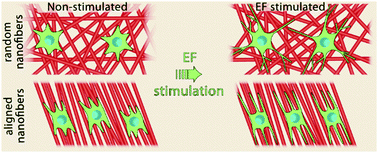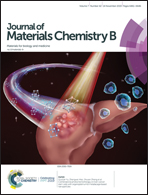Polypyrrole-coated cellulose nanofibers: influence of orientation, coverage and electrical stimulation on SH-SY5Y behavior†
Abstract
In the field of tissue engineering, much research has been devoted to the surface topography of conductive materials. However, less work has been carried out on how the electrical stimulation of such materials influences nerve regeneration. Here, we investigated the effect of electrical stimulation on randomly- and uniaxially-aligned polypyrrole-coated cellulose acetate butyrate (PPy/CAB) nanofibers. First, SEM revealed that the conducting PPy coverage resulted in dramatic changes to the nanofiber morphology. In turn, these changes led to an increase in the sample wettability. Fourier transform spectroscopy (FTIR) and X-ray photoelectron spectroscopy (XPS) confirmed the presence of a PPy layer. Second, human neuroblastoma cells (SH-SY5Y) were seeded on the PPy/CAB nanofibers and stimulated by 100 mV mm−1 at 1 Hz pulses in vitro. We demonstrated that either with or without this electrical stimulation both nanofiber alignment and PPy coverage had a strong influence on cell morphology and attachment. Moreover, fluorescence microscopy revealed that the cells stimulated on PPy/CAB had longer neurite outgrowth. Collectively, our results shed light on the combined effect of scaffold morphology and external stimulation on neuronal cell behavior.



 Please wait while we load your content...
Please wait while we load your content...